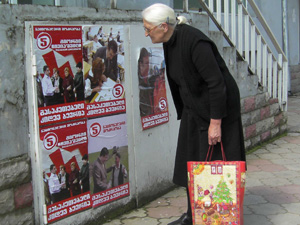According to the OSCE May interim report, the main focus has been on the election of the mayor of Tbilisi. The OSCE/ODIHR Election Observation Mission (EOM) has received allegations of violations from some opposition parties and non-governmental organizations, including pressure on candidates, illegal campaigning by state officials, and unequal access to administrative resources to the benefit of the governing party candidates.
According to the report, the compilation of preliminary voters’ lists in urban areas has been affected by some shortcomings in the address system, recent changes to street names and changes of precinct boundaries. Only 171 of over 11,000 citizens who were deregistered from the civil register at their landlord’s request applied within the legal deadline to DECs for inclusion in the voters list.
The OSCE/ODIHR EOM’s preliminary media monitoring results indicate a lack of balance in the prime-time news coverage of political subjects and candidates on most monitored television channels. Only the Georgian Public Broadcaster’s First Channel (GPB1) has offered its viewers a more balanced picture of the campaign. The very high price of paid political advertising on main nationwide television channels has limited candidates’ possibilities to campaign in the media.
Transparency International Georgia (TI) published the third interim report on the use of administrative resources for election campaign. The report covers the period of time between 5 May and 24 May 2010 and focuses on three types of administrative resources: coercive, logistical and human. Involvement of public officials and representatives of the power-wielding agencies in the election campaign was particularly frequent during the reporting period. Public officials engaged in agitation while performing their official duties, which is prohibited by the Electoral Code. Representatives of the power-wielding agencies, meanwhile, are banned from participating in an election campaign altogether.
The Human Rights Centre (HRIDC) has observed violations in different aspects. HRIDC report on pre-election monitoring speaks about the following violations: use of administrative resources; facts of threatening, pressure and bribing of the voters; extortion of money from businessmen; pressure on journalists and on political parties; etc. Local authorities took vacations and got involved in the pre-election campaign, although they still used to go to work and use administrative resources for the election campaign for ruling party. In addition to that, in private conversation with the HRIDC regional coordinators, many businessmen confirmed the fact that they were forced by law-enforcers to finance the election campaign of the ruling party. HRIDC regional office in Kakheti observed the facts in Akhmeta when local municipality threatened voters with ceasing social assistance if they do not vote for the National Movement. According to the HRIDC report, public school teachers are strictly instructed to vote for the National Movement, otherwise they will be fired. These are just few facts that HRIDC report speaks about.
The Georgian Young Lawyers Association (GYLA) presented the second mid-term report on the results of the pre-election monitoring. The report covers the period from April 23 to May 22. GYLA reports about the violations in the regions during pre-election campaign. These are, pressure and threatening on voters in the regions. The report says that representatives of the National Movement collect IDs of the votes in the region and if anybody refuses to give they are threatened with firing them or their family members from jobs. GYLA report speaks about the participation of regional law-enforcers in the pre-election campaign of the National Movement.
TI Georgia, association Law and Justice, ISFED and GYLA oppose rules for participation of military servicemen in 30 May elections.
According to Article 10.10(1) of the Georgian Electoral Code, the servicemen of the Defense Ministry’s and Interior Ministry’s military (paramilitary) forces and units are to participate both in the proportional and the single mandate constituency in the local elections if by the Election Day they are permanently deployed at one place for a year or more.
According to the amendment recommended by NGOs no military servicemen would be relocated shortly before the elections in order to influence the outcome of vote in specific electoral district(s). However, the Central Electoral Commission (CEC) and the ruling party representatives presently interpret Article 10.10(1) in a different way. According to them, all military servicemen who have signed, at any point prior to the compilation of the special voter list, a contract for a period of at least one year should be allowed to vote, even if this was done the day before the list was compiled.
Under the Georgian law, the minimum duration of a military service contract is three years, while the duration of mandatory military service is one year. The law does not allow for military service shorter than a year, which means that all military servicemen will be allowed to vote in the 30 May elections. The military and paramilitary servicemen can have a considerable impact on the outcome of vote in electoral districts. The CEC’s interpretation of Article 10.10(1) of the Electoral Code still makes it possible for the government to deliberately increase the number of military servicemen in specific electoral districts shortly before the elections in order to try to secure a favorable outcome of the vote.





